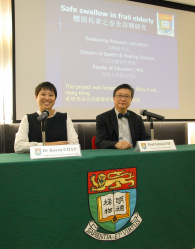Media
HKU Swallowing Research Laboratory releases survey findings on
“Facilitate aging in place:
safe swallowing in the frail elderly living in the community and in nursing homes”
03 Dec 2013

Dr Karen Chan, Assistant Professor (left) and Professor Edwin Yiu, Professor (right), Division of Speech and Hearing Sciences, Faculty of Education, HKU
Swallowing problems are commonly found in the elderly population. Studies have shown that swallowing problems may lead to poorer quality of life, malnutrition, dehydration which could be fatal. The prevalence and impact of swallowing problems among the elderly in Hong Kong are still unclear. Therefore, the Swallowing Research Laboratory of the Division of Speech & Hearing Sciences, Faculty of Education, the University of Hong Kong (HKU), has recently conducted a study on safe swallowing in frail elderly living in the community. The study had two main focuses: 1) to investigate the prevalence of swallowing problems in elderly people living in subsidized residential care service units and those receiving subsidized community support services; and 2) to assess the swallowing management knowledge and skills of frontline staff at residential care service units and caregivers of home-living elderly who have swallowing problems. The study was funded by the Public Policy Research Funding Scheme.
The study was conducted in three phases: Phase I) to obtain statistical data on the prevalence of swallowing problems through phone interviews; Phase II) to evaluate the impact of swallowing problems and service satisfaction through face-to-face interviews; and Phase III) carers’ knowledge and skill assessment. In Phase I, all subsidized residential care service units and community support service units for the elderly in HK were invited to participate. A total of 34 residential units and 21 support units reported their number of elderly residents who had swallowing problems. In Phase II, research team members visited 22 residential units and 20 support units to conduct face-to-face interviews with the elderly. A total of 878 elderly people (around 43% had swallowing problems) participated in the second phase. Finally, in Phase III, 504 front line staff from the residential units and 93 family members who took care of the frail elderly at home participated in the study.
Phase I: Prevalence of swallowing problems
The results indicated that around 30% of the elderly residents had mild swallowing problems, another 30% had moderate to severe swallowing problems. On the other hand, around 30% of the community support service users had mild swallowing problems and around 13% had moderate to severe swallowing problems.
Phase II: Impact of swallowing problems and service satisfaction
Results showed that elderly people with swallowing problems had poorer quality of life than those who did not have swallowing problems. Almost all of the elderly in the residential units and 60% of those from the support units reported that they had not received any swallowing assessments and treatments in the last 12 months. Around 70% of the elderly felt that they had appropriate mealtime assistance.
Phase III: Carers swallowing management knowledge and skills
In general, the carers had good knowledge and skills in meal preparation and basic feeding (such as body posture and rate and volume of feeding). However, around 80% of them were not aware of some of the high risk groups for eating disorders, e.g. those with history of head and neck cancer and Parkinson’s disease. The majority of the carers were not aware that such eating disorders may bring about negative emotional consequences such as anxiety and depression.
For media enquiries, please contact Ms Queenie Wong, Senior Manager (Development and Communications), Faculty of Education (Tel.: 2219 4270 / Mobile: 9220 5840 / Email: qlpwong@hku.hk Please visit http://web.edu.hku.hk/media.php to view the e-version of the press release. The powerpoint and photos can be downloaded at http://web.edu.hku.hk/press/20131203/.
